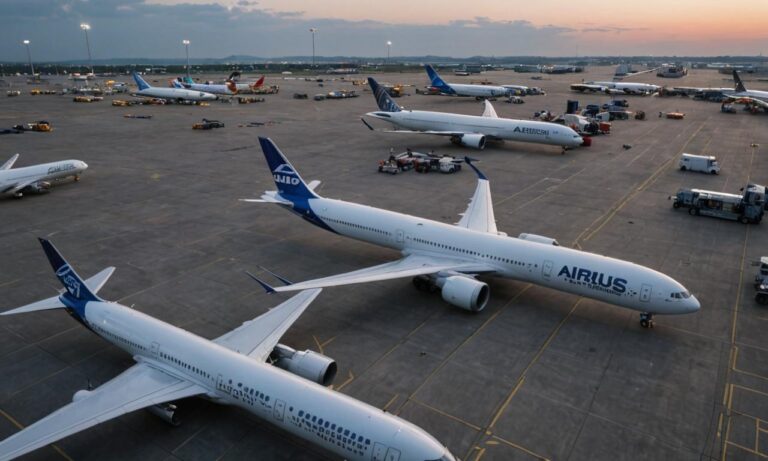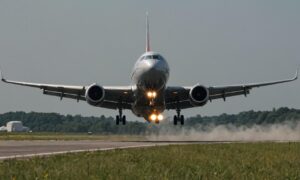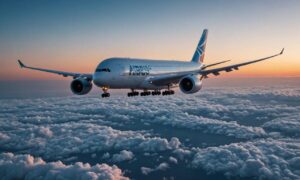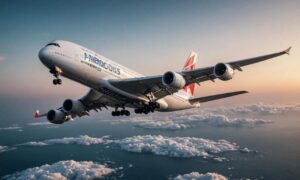When it comes to comparing two of the most prominent aircraft in the aviation industry, the Airbus A350 and the Boeing 777, there are various factors to consider. Both these aircraft are renowned for their advanced technology, efficiency, and comfort, catering to the demands of modern airlines and passengers.
Design and Technology
One of the primary differences between the Airbus A350 and the Boeing 777 lies in their design philosophies and technological advancements.
| Aspect | Airbus A350 | Boeing 777 |
|---|---|---|
| Materials | The A350 features a significant usage of composite materials such as carbon fiber, enhancing fuel efficiency and reducing weight. | The Boeing 777 utilizes aluminum alloys extensively, with newer variants incorporating composite materials in specific areas for weight reduction. |
| Cabin Environment | The A350 offers a more spacious and comfortable cabin with larger windows and improved air quality, providing a better passenger experience. | While the 777 also offers a comfortable cabin, the newer variants come with updated cabin features to enhance passenger comfort. |
| Technology | The A350 incorporates the latest avionics and fly-by-wire technology, offering improved handling and efficiency. | The Boeing 777 features advanced cockpit systems and automation, ensuring smooth operations and enhanced safety. |
Performance
Performance is a crucial aspect when comparing these two aircraft, considering factors such as range, fuel efficiency, and payload capacity.
| Aspect | Airbus A350 | Boeing 777 |
|---|---|---|
| Range | The A350 has impressive range capabilities, offering airlines the flexibility to operate long-haul routes efficiently. | The Boeing 777 also boasts excellent range capabilities, making it a popular choice for long-haul flights across the globe. |
| Fuel Efficiency | With its advanced aerodynamics and fuel-efficient engines, the A350 consumes less fuel per passenger, reducing operating costs for airlines. | The Boeing 777 is known for its fuel efficiency, especially in its newer variants, which feature updated engines and aerodynamic improvements. |
| Payload Capacity | The A350 offers a competitive payload capacity, allowing airlines to carry a significant amount of cargo and passengers. | The Boeing 777 has a slightly higher payload capacity, making it suitable for transporting larger loads over long distances. |
Market Acceptance
Both the Airbus A350 and the Boeing 777 have garnered widespread acceptance in the aviation industry, with many airlines operating these aircraft on various routes around the world.
- The A350 has gained popularity among airlines for its fuel efficiency, range capabilities, and passenger comfort.
- The Boeing 777 remains a staple in long-haul operations, known for its reliability, performance, and versatility.
Overall, both the Airbus A350 and the Boeing 777 are exceptional aircraft, each with its own set of strengths and advantages. The choice between the two ultimately depends on the specific requirements and preferences of airlines and passengers.
vironmental Impact
Another significant aspect to consider when comparing the Airbus A350 and the Boeing 777 is their environmental impact.
| Aspect | Airbus A350 | Boeing 777 |
|---|---|---|
| Emissions | The A350 is designed with fuel efficiency in mind, resulting in lower emissions per passenger compared to older aircraft models. | The Boeing 777 also strives for improved fuel efficiency, contributing to reduced emissions during flight operations. |
| Noise Levels | Due to advancements in engine technology and aerodynamics, the A350 produces lower noise levels both inside the cabin and for communities around airports. | The Boeing 777 has made strides in reducing noise pollution, although noise levels can vary depending on factors such as engine type and maintenance. |
| Sustainability Initiatives | Airbus has implemented sustainability initiatives, such as eco-friendly materials and production processes, to reduce the environmental footprint of the A350. | Boeing has also undertaken efforts to enhance sustainability, including eco-demonstrator programs and investments in alternative fuels research. |
Frequently Asked Questions
- Which aircraft is more environmentally friendly?
- How do the Airbus A350 and Boeing 777 compare in terms of emissions?
- Do these aircraft have noise reduction features?
- What sustainability initiatives have Airbus and Boeing implemented for these aircraft?






